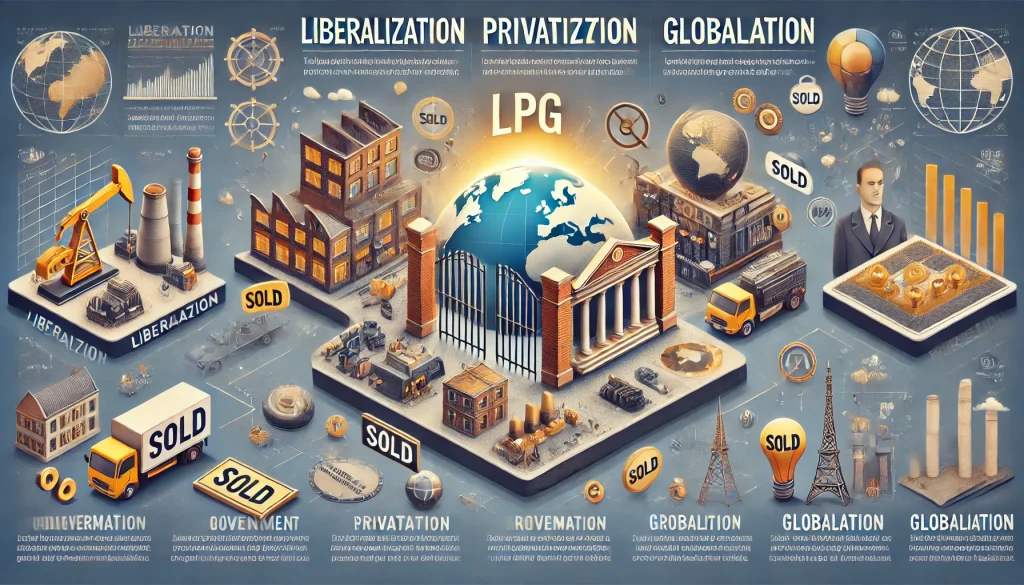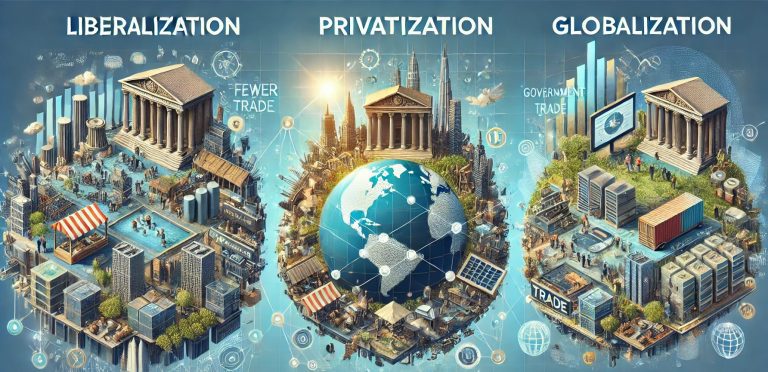Liberalization, Privatization, and Globalization short form LPG, is a trilogy of economic reforms that have transformed economies worldwide, especially the economies of developing nations like India. The concept of liberalizing economies from the erstwhile state-controlled structure to a market-oriented one encourages competition, efficiency, and growth. First implemented in India in 1991 through the New Economic Policy, LPG reforms have since then emerged to be an inalienable part of current economic policies among other countries as well. It is indeed important to understand LPG for any student of economics, commerce, or international trade because such areas have wide-reaching consequences for businesses, governments, and the global economy.
What is Liberalization, Privatization, and Globalization?
Liberalization, privatization, and globalization are interconnected processes that help in economic development.
Liberalization is the removal of government restrictions and regulations in an economy. All this is for the purpose of letting competition come into areas like finance, trade, and industry for efficiency and increased investment. Restriction of such barriers as tariffs and licenses decreases through liberalization, which makes the economy more competitive worldwide.
Privatization is a concept of privatization that translates to passing control of enterprises from the public sector (government-controlled) to the private sector. This should bring more efficiency, reduce bureaucracy, and provide more innovation because private enterprises are normally profit-driven and answerable to shareholders.
Globalization describes how companies and other organization bodies exercise their international influence or operate internationally. It would allow the free flow of goods, services, capital, and labor across borders whilst integrating the economy into the global market.

Difference Between Liberalization, Privatization, and Globalization
While liberalization, privatization, and globalization are often discussed together, they have distinct meanings and applications in economic contexts.
| Aspect | Liberalization | Privatization | Globalization |
|---|---|---|---|
| Definition | Reduction of government controls in economic sectors | Transfer of ownership from public to private sectors | Expansion of businesses and economies across borders |
| Goal | Increase competition, enhance efficiency | Improve enterprise performance through private ownership | Integrate domestic economies with global markets |
| Scope | Domestic economy | Specific sectors or companies | Global markets |
| Key Mechanism | Deregulation, tax reforms | Sale of public enterprises, IPOs | International trade agreements |
| Main Impact | Market efficiency, better pricing | Increased profitability, better customer service | Cultural exchange, foreign investments |
Whereas liberalization opens up sectors, privatization works on ownership, and globalization works on connecting the local economy with the world. When all these processes are combined together, it forms an environment in terms of growth, innovation, and efficiency.
Fun Fact
Did you know? India’s software industry is a prime example of the positive effects of globalization. Since the 1990s, India has become a global IT hub, thanks to foreign investments and outsourcing opportunities brought about by globalization.
Impact of Liberalization, Privatization, Globalization (LPG) on Industrial Development
The impact of LPG reforms on industrial development has been profound, transforming industries in many countries, especially emerging economies.
Liberalization’s Impact on Industry
Deregulation now allows industries to compete with each other more easily, most especially in those that used to be highly regulated and controlled earlier. The outputs of the sectors like telephony, airlines, and banking have increased exponentially with deregulation. By removing cumbersome regulations, businesses have gained easy access to capital markets, which stimulates innovation and expansion.
- Increased Competition: Companies face competition, which encourages them to improve product quality and efficiency.
- Market Expansion: Liberalization has allowed businesses to explore new markets both domestically and globally.
- Foreign Investment: With fewer restrictions, foreign direct investment (FDI) has flowed into many industries, bringing in new technology, skills, and capital.
Privatization’s Impact on Industry
Privatization has impacted the public enterprise considerably by making most of them profitable ventures. For example, privatized management brings in better use of resources, cost-cutting, and innovation.
- Increased Efficiency: Privatized entities have been streamlined to ensure efficiency, reduce waste, and increase productivity because they operate to make profits.
Attracting Investment: Privatization often attracts foreign investments because private firms are more likely to give greater returns than state-owned enterprise firms. - Reduced government burden: Privatisation curbs the economic burden of the government, saving it for more critical sectors such as healthcare and education.
Globalization’s Impact on Industry
Globalization has fundamentally changed the landscape of the industry since it has opened up huge markets, reduced the cost of production, and facilitated the crossing over of technology and ideas.
- Availability of International Markets: The industries can now sell goods and services in international markets. This increases revenues.
- Global Supply Chain: Companies source raw materials and labor from countries where the cost is cheaper, which improves cost efficiency.
- Technology Transfer: Industries can acquire new technologies and business techniques from other countries when they globalize; therefore, productivity and innovation increase.
Reforms in terms of liberalization, privatization, and globalization have brought about many changes that currently bring changes in global and domestic economies. Reduction in government intervention, privatization, and linking the local economy to the world markets will enforce industrial growth, improvement in efficiency, and competitiveness. More so, for countries like India, these reforms will be very remarkable in terms of progress within specific sectors such as technology, manufacturing, and services. Hence, becoming more important in planning future economic strategies.
Liberalization, Privatization, and Globalization FAQs
What is the main goal of liberalization?
Liberalization aims to reduce government regulations in industries, encouraging competition and improving market efficiency.
How does privatization impact the economy?
Privatization improves efficiency, attracts investment, and reduces the financial burden on governments by transferring ownership to private entities.
What are the benefits of globalization?
Globalization expands market access, reduces production costs, encourages technology transfer, and promotes cultural exchange.
How has liberalization benefited India?
Liberalization has allowed India to attract foreign investments, increase industrial competition, and enhance market efficiency, contributing to economic growth.
Can globalization negatively impact domestic industries?
Yes, globalization can lead to increased competition from international firms, which may negatively impact local industries that are not competitive.


